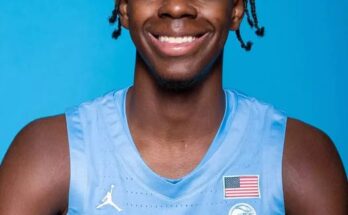Here’s a full, in‑depth look at Jenna Plumley—her remarkable rise as a freshman sharpshooter for the Oklahoma Sooners, background as a proud Native American from Oklahoma, and the major moments, challenges, and legacy she crafted both on and off the court.
Jenna Plumley hails from Red Rock, Oklahoma, where she grew up embracing her rich Native American heritage. She is of full-blood descent from the Comanche, Otoe, Pawnee, and Pueblo tribes—an identity that shaped her early life, inspired strong family ties, and fueled her drive to succeed in sports
Her upbringing was rooted in small-town values. Plumley attended Frontier High School, rising to become a standout basketball player. Her performances there turned heads at the University of Oklahoma, earning her a place in the Sooners’ elite program. Even before arriving in Norman, she was carrying the hopes of her tribe—existing as a rare example of Indigenous representation at the Division I level
In January 2007, Plumley was profiled in CBS’s “Pride, Passion and Power”, spotlighting her unique story and her role as one of the few full‑blood Native Americans playing major college basketball (soonersports.com). The segment aired regionally on Oklahoma women’s basketball broadcasts, celebrating her family, her culture, and her rapid ascent.
Impactful Freshman Performances
Joining the Sooners as a freshman point guard in early 2007, Plumley shook up the lineup. On February 12, 2007, she made her first career start against Texas. In that game, she was electric: 11 points, 8 assists, 5 steals, and 4 rebounds, setting five career bests in a single night (soonersports.com, soonersports.com). This performance sparked a dominant 78–58 victory for Oklahoma (newson6.com).
Just five days later, on February 17, Plumley started again—this time at Texas Tech. She exploded for a career-high 22 points, drilling 6 of 8 from three-point range, which was more than her total number of Big 12 threes combined before that night . Her sharpshooting was pivotal in a thrilling 70–67 win on the road (newson6.com).
Her breakout week earned her Big 12 Rookie of the Week honors on February 19, 2007, marking her as a force to watch (newson6.com).
By February end, Plumley was averaging around 8.2 points, 4.2 assists, and 2.8 steals over five key games—a massive rise from her season averages of roughly 3.7 points and 1.6 assists (soonersports.com).
As a freshman, Plumley anchored the Sooners in the 2007 NCAA tournament. In the first round against Southeast Missouri State, she recorded 20 points—including six threes—and added seven assists, pushing Oklahoma past the Redhawks 74–60 (texaslonghorns.com).
At just 5-foot-4, Plumley was small in stature but enormous in impact—an electrifying spark and clutch performer in prime tournament moments.
Plumley stood out for her elite three-point shooting. She shot around 38–39% from deep by season end—ranking among the top in the conference . Her breakout performance at Texas Tech, where she hit 75% from three (6-of-8), cemented her reputation as a pure sniper under pressure .
Known for her lightning‑fast hands, Plumley excelled in steals, which often led to fast-break points. Against Texas, she tallied five steals, showcasing her defensive instincts (soonersports.com). As a full court disruptor, she filled stat sheets with rebounds, assists, and turnovers forced.
Leadership Beyond the Stats
Despite her height, Plumley brought intensity and heart. She injected vitality into the Sooners, especially when she stepped into the starting lineup, lifting the team’s energy and morale .
Despite her promising freshman season, Plumley faced a major setback in 2008-2009. She was suspended from the Oklahoma program following charges of trying to steal makeup from a Walmart, valued at $34 (foxsports.com).
According to her mother, that difficult period starkly revealed how much she had drifted from her roots and values. Plumley herself described being unhappy at Oklahoma, despite starting consistently . The small-town athlete was overwhelmed by the pressures of elite college life.
After her departure from Oklahoma, Plumley found a new beginning at Lamar University, located in Beaumont, Texas—about 480 miles away from her home (foxsports.com).
At Lamar, Plumley revitalized her career. She embraced being a leader and mentor, particularly to young girls aged 2–7, showing the coach-player bond running deeper than winning games .
In her first season with the Lady Cardinals, she shattered Southland Conference records, notching a whopping 107 three-pointers and 220 assists, earning herself Southland Player of the Year (foxsports.com).
Her contributions led Lamar to the NCAA tournament in 2010—their first appearance since 1991. They faced WVU in the Memphis Regional, where Plumley had once again returned to the court where she had shined as a Sooner (foxsports.com).
Plumley’s presence resonated within Native American communities. Fans of the Alabama-Coushatta tribe traveled to watch her play in Beaumont, and supporters from South Dakota even drove out for season openers (foxsports.com). She later reflected, “When something like that happens, you really find out who is there for you… The Native Americans have never left my side.” (foxsports.com)
Her decision to walk away from the shadows of her mistakes and embrace a supportive, family-like environment was transformative.
Her success at Lamar drew global attention. In August 2011, Plumley signed a professional contract to play in Cagliari, Italy (beaumontenterprise.com).
Arriving on August 21, 2011, she embarked on a new chapter—playing overseas while continuing to honor her community and hometown roots. She described it as an opportunity for gratitude, offering fulfillment to both herself and her family .
Plumley’s journey resonated beyond the court. As a full-blood Native American athlete at the Division I level, and later at the professional level, she carried the visibility of her tribes—Comanche, Otoe, Pawnee, Pueblo—with every game (soonersports.com).
She inspired young Indigenous athletes, proving that representation matters and striving at elite levels is possible without losing connection to identity.
Narrative of Redemption
The arc of Plumley’s path—from early success, through personal missteps, to reinvention and international play—underscores a theme of second chances. At Lamar, she flourished. In Italy, she pushed boundaries further. She showed that talent paired with character, values, and community support can shine even brighter after adversity.
Jenna Plumley’s story is more than sports. Representing her tribal communities while competing at top levels broke barriers and inspired visibility for full-blood Native American athletes, often overlooked in elite athletics .
Her freshman year surge, three-point dominance, and tournament heroics at Oklahoma cemented her place in Sooners lore—even as her tenure was brief. Later, at Lamar, she rewrote the records—statistics like her 107 threes and 220 assists in a single season speak volumes (foxsports.com).
Facing public challenges, she could have disappeared into obscurity. Instead, she owned her missteps, reset her career, and thrived in a supportive environment—turning public disgrace into personal renaissance.
Jenna Plumley’s impact transcends wins and stats. She stands as a symbol of resilience, cultural pride, and the power of reinvention. From Red Rock to Norman, Beaumont to Cagliari, her journey maps not just athletic triumph, but character reborn.
She reminds us:
- Representation matters—she stood tall for Indigenous athletes in arenas rarely seeing them.
- Second chances can redefine legacy—computer chip-like brilliance at Lamar and in Italy emerged only after mistakes.
- Small stature, big heart—Plumley showed that determination and skill outrank height and expectations.
Though just a freshman at Oklahoma, she left an outsized impact. She sparked cultural pride; then, after falls, she soared again. Her story is one of light, rebirth, and enduring hope—a benchmark for every athlete whose path wavers but whose spirit remains unwavering.



